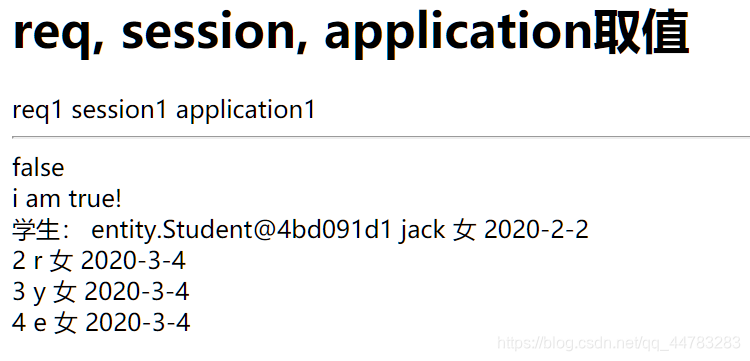el表达式的使用
- 学生类
public class Student {int id;String name;String sex;String birth;public Student() {}public Student(int id, String name, String sex, String birth) {super();this.id = id;this.name = name;this.sex = sex;this.birth = birth;}// el 表达式取实体类的属性,需要设置get方法public int getId(){return id;}public String getName(){return name;}public String getSex() {return sex;}public String getBirth() {return birth;}}-
取域对象request,session,application的值
-
取学生对象的值
-
取集合对象的值
-
servlet doService方法如下
protected void service(HttpServletRequest req, HttpServletResponse resp)throws ServletException, IOException {// 请求编码req.setCharacterEncoding("UTF-8");// 响应编码resp.setContentType("text/html;charset=UTF-8");// 设置request, session, application域对象的值req.setAttribute("req", "req1");req.getSession().setAttribute("session", "session1");req.getServletContext().setAttribute("app", "application1");// 设置学生对象req.setAttribute("stu", new Student(1, "jack", "男", "2020-2-2"));// 设置集合对象List<Student> list = new ArrayList<Student>();list.add(new Student(2, "r", "女", "2020-3-4"));list.add(new Student(3, "y", "女", "2020-3-4"));list.add(new Student(4, "e", "女", "2020-3-4"));req.setAttribute("list", list);// 请求转发到index.jsp页面req.getRequestDispatcher("index.jsp").forward(req, resp);}
- jsp页面
<%@ page language="java" import="java.util.*" pageEncoding="UTF-8"%>
<%@ taglib uri="http://java.sun.com/jsp/jstl/core" prefix="c" %>
<%-- jsp/jstl/core --%>
<%
String path = request.getContextPath();
String basePath = request.getScheme()+"://"+request.getServerName()+":"+request.getServerPort()+path+"/";
%><!DOCTYPE HTML PUBLIC "-//W3C//DTD HTML 4.01 Transitional//EN">
<html><head><base href="<%=basePath%>"><title>My JSP 'index.jsp' starting page</title><meta http-equiv="pragma" content="no-cache"><meta http-equiv="cache-control" content="no-cache"><meta http-equiv="expires" content="0"> <meta http-equiv="keywords" content="keyword1,keyword2,keyword3"><meta http-equiv="description" content="This is my page"></head><body><h1>req, session, application取值</h1><%-- 取域对象的值 --%>${ req }${ session }${ app }<hr/><%-- 判断空 --%>${ empty 1 }<c:if test="true"><br/>i am true!</c:if><br/>学生:${ stu } <%-- 学生对象 --%>${ stu.name } ${ stu.sex } ${ stu.birth } <br/><%-- 取list的值 --%><c:forEach items="${ list }" var="stu">${ stu.id }${ stu.name }${ stu.sex } ${ stu.birth } <br/></c:forEach></body>
</html>
- 超链接参数取值
<a href="index.jsp?row_id=1">c标签取get</a>
// index.jsp页面 el表达式取值
${ param.row_id }

c标签的使用,取的别名c
- 导入jstl库,别导错了,还有一个标签库跟下面的很像。
<%@ taglib uri="http://java.sun.com/jsp/jstl/core" prefix="c" %>
<c:if test="${ 1==1 }">1=1</c:if><c:choose><c:when test="true">true</c:when><c:when test="false">false</c:when><c:otherwise>false</c:otherwise></c:choose><c:forEach begin="1" end="5" step="1" var="i">${ i }</c:forEach>



:构造函数 原型 实例的关系)














)

